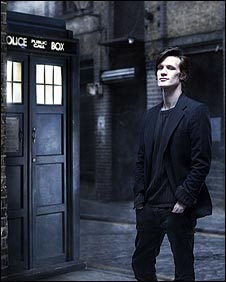In the Jonah Hex review below, I mentioned the intriguing casting of James McAvoy and Michael Fassbender as Professor X and Magneto respectively. Now, Matthew Vaughn’s X-Men: First Class circles ’round its White Queen in Alice Eve of She’s Out of My League and Sex and the City 2. Haven’t seen either of those, but she looks the part…although I still might’ve gone with Rosamund Pike myself.
Tag: James McAvoy
“Law & Order: Civil War Unit.”
“Redford says he didn’t want to simply re-create Lincoln’s assassination and deals with that mainly as setup. ‘All the President’s Men was very similar, because you had this big historical event taking place, but what people didn’t know was what these two reporters did, digging in under the radar. You didn’t need to show Nixon a lot,’ he says.“
USA Today checks in on the set of Robert Redford’s The Conspirator, about the trial of Mary Surratt, with Robin Wright Penn, James McAvoy, Toby Kebbell, and Alexis Bledel. (This is not to be confused with the long-gestating film adaptation of Manhunt or Steven Spielberg’s seemingly cursed attempt at a Lincoln biopic.)
Who What Now?
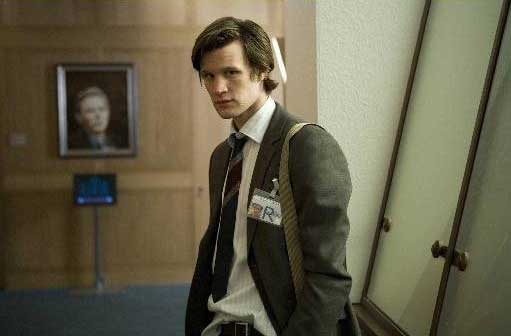
Benjamin Button isn’t the only fellow growing younger these days: Official word just came down from the BBC powers-that-be that 26-year-old Matt Smith has been cast as the next iteration of Doctor Who, for Stephen Moffatt’s first full season as showrunner, beginning in 2010. (David Tennant will still be holding down the fort for a few more specials in 2009 — he regenerates next Christmas.)
Well, I don’t know anything about this fellow, so I can’t really evaluate the pick until I’ve seen him face down a few Daleks and the like. But given the A-lister and outside-the-box names that have been floating around over the past few weeks (James McAvoy, Bill Nighy, Chiwetel Ejiofor, Catherine Zeta Jones, etc.), it’s hard not to feel slightly disappointed about this. Ah well, I’ll manage.
Frat Club.
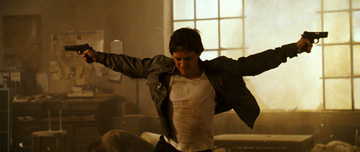
Fool me once, shame on you. Fool me [twice], you can’t get fooled again. A leaden mishmash of The Matrix, Fight Club, and various much-more-entertaining FPS shoot ’em ups, Timur Bekmanbetov’s aggressively dumb and derivative Wanted is what I’d call a total misfire…if it wasn’t totally in keeping with the similarly adrenaline-fueled, barely coherent nonsense that was Night Watch. I haven’t read the source material, although a quick peek at the Wikipedia (and the fact it was penned by Mark Millar) suggests it was probably much more wry and entertaining than this flick turned out to be (and made more sense, given it’s set in a universe with supervillains.)
As it is, however, Wanted plays like Michael Bay’s version of Gus Van Sant’s Elephant, a hyperbolic, stultifying stupid, aggro-laced paean to the Columbine mentality. Now, I’m all for leave-your-brain-at-the-door actioners, and I could forgive Wanted its video game physics, its cheap-and-easy nihilism, its plagiarism from much better movies, and its intrusive whiteboy angst-metal if the movie actually turned out to be entertaining. But, a few minor setpieces aside (namely the limousine hit, which was everything ths film should’ve been in 60 seconds — perhaps Bekmanbetov should try his hand at videos), Wanted is basically the opposite of fun. Like Night Watch, it’s so bogged down by turgid plotting and long bouts of needless exposition (as well as, in this case, scenes cobbled together from other sources) that the film has no pulse. How bad is it? When a baby started screaming in my theater during the final act (when Morgan Freeman started monologuing yet again in the Fraternity’s library), prompting a yelling match between the disgruntled babyless (“Get that goddamn kid out of here!) and the babied (“F**k you! Babies have rights too!“), I was kinda thankful for, at long last, an entertaining diversion.
As Wanted begins, we are introduced to one Wesley Gibson (James McAvoy, who seemed to have learned his American accent solely from Billy Zabka movies and Sprite commercials.) Gibson is a depressed, obsequious worker drone somewhere in the Great American Cubicle Hive — Chicago, to be precise. He hates his job, he hates his boss, he hates his routine, and his “best” friend is pretty obviously sleeping with his aggravating girlfriend. Gibson is such a capital-L Loser, in fact, that his relatively common name brings up 0 hits on Google. (Sigh…would that were the most ridiculous thing about this movie.) One day, however, he is approached in the local supermarket by “Fox”, an alluring — albeit currently on the wrong side of skinny — minx (Angelina Jolie, trying but clearly bored), who immediately gets him involved in a shoot-out and car chase against a rival killer (Thomas Kretchmann).
From there, Gibson is soon initiated into a secret and ancient cabal of assassins known as the Fraternity, led by Morgan Freeman (playing Lawrence Fishburne playing Morpheus) and including members such as The Gunsmith (Common), The Butcher (Konstantin Khabensky), and The Repairman (Marc Warren). Each of these FPS Minibosses, basically, train Gibson in the arts of their order (it seems to involve him needlessly getting his ass kicked a lot) until he’s reached his full potential as a genetic prodigy, and can thus seek out and kill the murderer of his father. But who are these assassins actually killing, and for what purpose? Even total badasses, it seems, aren’t free of the occasional moral quandary.
That’s basically the set-up — If it sounds like you’ve heard variations on this story before, you have. I neglected to mention the scene involving Gibson’s father’s final mission, which [a] plays almost exactly like Trinity’s early shenanigans in The Matrix and [b] first establishes that, here, bullets not only travel for miles but can bend their trajectory in flight. This may sound like a cool idea to some, I guess — for me, it put me right in House of Flying Daggers mode. Once you’ve established something so ridiculous, it’s hard to feel invested in any of the ensuing action sequences. There’s no danger at all if the laws of physics don’t apply — You’re just going to show me what you show me, and that’s that. (I would argue that movies like The Matrix bend these sorts of rules, but don’t break them. Besides, the Wachowskis introduced a higher-level threat with the Agents anyway.) In any case, magically-bending bullets is only one example of the suspension of disbelief required here. Don’t get me started on the Loom, or the Moravian Express, or the Total Miracle Body Bath, or anything else in Wanted. Like Night Watch, it doesn’t make a lick of sense.
Again, I could have looked all that over if the movie was good fun regardless. But, it’s not. When Wanted isn’t drowning in expository gobbledygook — which is most of the time — it brays at you with idiotic macho posturing. (There’s a reason a Dubya quote came to mind above when writing this — this is a film tailor-made for “windshield cowboys” and tough guy poseurs.) In other words, Wanted is basically Fight Club for the fratboy Nickleback set, without the intellect or sense of irony that made Fincher’s movie one of the best of the ’90’s. Jolie especially does what she can — she’s a star through and through — but she can’t redeem this boring, moronic pile of dren. In other words, folks, Wanted is effing terrible. In the final moments, McAvoy breaks the fourth wall and asks us, “What the f**k have you done lately?” Sadly, I went to see this film.
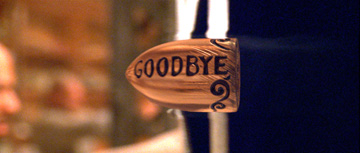
Fear and Loathing in Bendy-Bulletland.
In the trailer bin, assassin-prodigy James McAvoy foregoes the doldrums of cubicle life for quality time with Angelina Jolie in the new domestic trailer for Timur Bekmambetov’s Wanted, a.k.a. this summer’s big dumb Matrix-y action flick (and, mind you, I don’t mean that perjoratively in the slightest.) And director Alex Gibney of Enron: The Smartest Guys in the Room and Taxi to the Dark Side takes on the Good Doctor in the new trailer for Gonzo: The Life and Work of Hunter S. Thompson. Not sure if the latter will make it to this area, but I’m looking forward to it.
McAvoy of Bag End.
Will James McAvoy play Bilbo Baggins? That’s the current rumor. “[D]irector del Toro adds, ‘I can tell you it’s down to a few names that we all agree upon. For our first choice, completely magically we all have the same name.’”
Grow Young or Die Trying.
As seen in front of Indiana Jones and the Kingdom of the Crystal Skull (twice), Brad Pitt goes back in time in the trailer for David Fincher’s Curious Case of Benjamin Button, from the story by F. Scott Fitzgerald and also featuring Cate Blanchett, Tilda Swinton, Taraji P. Henson, Jason Flemyng, Elias Koteas and Julia Ormond. (Until it officially is released, this is the Spanish-language version.) Looks intriguing…and is it just me, or is it exceedingly strange to see Swinton and Blanchett in the same film?
Also in today’s trailer bin: Robert DeNiro and Al Pacino look for two full hours of that Heat magic in the second preview for Jon Avnet’s Righteous Kill, also starring Carla Gugino, John Leguizamo, 50 Cent, Brian Dennehy, and Donnie Wahlberg. (I’m not sold yet, even if Inside Man‘s Russell Gewirtz is the scribe.) And, over in former Soviet Union, the new international, R-rated trailer for Timur Bekmambetov’s Wanted pops up on the grid, with James McAvoy, Angelina Jolie, Morgan Freeman, Common, Terrence Stamp, and Thomas Kretschmann. Definitely maybe…although Night Watch had a good preview too.
Update: I neglected to post this one the other day: Uptown girl Nicole Kidman and cowboy Hugh Jackman find love during World War II in the trailer for Baz Luhrmann’s historical epic Australia. Not really my cup of tea, but you never know.
2007 in Film.
Happy New Year, everyone. So unlike last year, when I took an extra month on account of my travels in New Zealand, the Best of 2007 Movie list seems ready to go out on schedule, and it’s below. (If you’ve been reading all the reviews around here, I’m betting the top few choices won’t be a surprise. Still, organizing the 5-15 section was more tough than usual this year.) At any rate, 2008 should be a big orbit around the sun in any event, what with grad school winding down and it being time — at last! — to pick a new president. So a very happy new year to you and yours, and let’s hope the movies of the coming year will contain to sustain, amuse, baffle, and delight.
[2000/2001/2002/2003/2004/2005/2006]


2. No Country for Old Men: It probably won’t do wonders for West Texas tourism. Still, the Coens’ expertly-crafted No Country works as both a visceral exercise in dread and a sobering philosophical rumination on mortality and the nature of evil. (And in his chilling portrayal of Anton Chigurh, Javier Bardem has crafted a movie villain for the ages.) People sometimes refer to Coen movies as “well-made” as a dig, as if the brothers were just soulless clinically-minded technicians. I couldn’t disagree with that assessment more. Still, No Country for Old Men seems so seamless and fully formed, so judicious and economical in its storytelling, that it reminds me of Salieri’s line in Amadeus: “Displace one note and there would be diminishment, displace one phrase and the structure would fall.” A dark journey that throbs with a jagged pulse, No Country for Old Men is very close to the best film of the year, and — along with Miller’s Crossing, Fargo, and The Big Lebowski — yet another masterpiece sprung from the Coens’ elegant and twisted hive-mind. Bring on Burn After Reading.

3. The Diving Bell and the Butterfly: Through the wonders of cinematic alchemy, Julian Schnabel took the sad real-life account of Vogue editor Jean-Do Bauby’s horrific imprisonment within his own body and made it soar. No other film this year put the “locked-in” experience of taking in a movie as inventively in service of its story (although I kinda wish Atonement had tried.) Special kudos to Mathieu Almaric for conveying so much with so little to work with, and to Max von Sydow for his haunting turn as Bauby’s invalid father. And, lest someone holds “arthouse foreign film” against it, Diving Bell is both much funnier and more uplifting than anyone might expect of a tale about hospital paralysis. Salut.
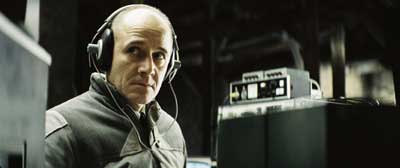
[3.] The Lives of Others: The one hold-over from 2006 on the list this year (I was pretty thorough about catching up before posting last January, although I still never did see Inland Empire), The Lives of Others is a timely and compelling parable of art, politics, surveillance, and moral awakening in the final days of the Stasi. In a way, Lives is an East German counterpart to Charlie Wilson’s War, a story about how even small political acts of individual conscience can change the world, even (or perhaps especially) in a decaying Orwellian state. With a memorable central performance by Ulrich Muhe and a languid conclusion that ends on exactly the right note, the resoundingly humanist Lives of Others is a Sonata for a Good Man in Bad Times. We could use more of its ilk.

4. Knocked Up: Judd Apatow’s sweet, good-natured take on modern love and unwanted pregnancy was probably the most purely satisfying film of the summer. As funny in its pop-culture jawing as it was well-observed in its understanding of relationship politics, Knocked Up also felt — unlike the well-meaning but overstylized Juno, the film it’ll most likely be paired with from now herein — refreshingly real. As I said in my recent review of Walk Hard, an eventual Apatow backlash seems almost inevitable given how many comedies he has on the 2008 slate. Nevertheless, we’ll always have Freaks & Geeks, and we’ll always have Knocked Up.

5. The Bourne Ultimatum: The third installment of the Bourne franchise was the best blockbuster of the year, and proved that director Paul Greengrass can churn out excellent, heart-pounding fare even when he’s basically repeating himself. Really, given how much of Ultimatum plays exactly like its two predecessors on the page — the car chase, the Company Men, the Eurotrash assassin, Julia Stiles, exotic locales and cellphone hijinx — it’s hard to fathom how good it turned out to be. But Bourne was riveting through and through…You just couldn’t take your eyes off it. I know I’ve said this several times now, but if Zack Snyder screws up Watchmen (and I’d say the odds are 50-50 at this point), the lost opportunity for a Greengrass version will rankle for years.

6. Zodiac: The best film of the spring. What at first looked to be another stylish David Fincher serial killer flick is instead a moody and haunting police procedural about the search for a seemingly unknowable truth, and the toll it exacts on the men — cops, journalists, citizens — who undertake it for years and even decades. Reveling in the daily investigatory minutiae that also comprise much of The Wire and Law and Order, and arguably boasting the best ensemble cast of the year, Zodiac is a troubling and open-ended inquiry that, until perhaps the final few moments, offers little in the way of satisfying closure for its characters or its audience. Whatever Dirty Harry may suggest to the contrary, the Zodiac remains elusive.

7. 28 Weeks Later: Sir, we appear to have lost control of the Green Zone…Shall I send in the air support? Zombie flicks have been a choice staple for political allegory since the early days of Romero, but one of the strengths of Juan Carlos Fresnadillo’s merciless 28 Weeks Later — perhaps the best horror sequel since James Cameron’s Aliens — is that it foregoes the 1:1 sermonizing about failed reconstructions and American hubris whenever it gets in the way of the nightmare scenario at hand. (Besides, if you wanted to see explicit muckraking about current events this year, there were options aplenty, from In the Valley of Elah to No End in Sight, although plenty of this year’s politically-minded forays — Rendition, Lions for Lambs — looked rather inert from a distance.) There’s little time for moralizing in the dark, wretched heart of 28 Weeks Later: In fact, the right thing to do is often suicide, or worse. You pretty much have only one viable option: run like hell.

8. In the Valley of Elah: Paul Haggis’ surprisingly unsentimentalized depiction of the hidden costs of war for the homefront, Elah benefits greatly from Tommy Lee Jones’ slow burn as a military father who’s lost his last son to a horrific murder. In fact, it’s hard not to think of Jones’ inspired performances here and in No Country of a piece. There was something quintessentially America-in-2007 about Jones this year. In every crease and furrow of this grizzled Texan’s visage, we can see the wounds and weariness of recent times, the mask of dignity and good humor beginning to slip in the face of tragic events and colossal stupidity. Jones is masterful in Elah, and while Daniel Day-Lewis seems to be garnering most of the accolades for There Will Be Blood and Philip Seymour Hoffman stunned in three pics this fall (all on the list below), I’d put Jones’ work here as the best of the year.

9. There Will Be Blood: Ah, the maddening There Will Be Blood. I just reviewed this one yesterday, so it’s doubtful my opinion on it has changed much. But what Anderson’s film reminds me of most at the moment (and not only for the Daniel Day-Lewis connection) is Scorsese’s Gangs of New York, a movie I reviewed at the end of 2002 and then bumped up a few spots a week later when writing the 2002 list, thinking that its flaws would diminish over time. They haven’t — if anything, they’re just as noticeable as ever. So it may well be with TWBB. Even despite its somewhat unseemly pretensions to greatness, the first hour or so of There Will Be Blood, from the Kubrickian opening to the Days in Heaven-ish burning oil rig, is as powerful and memorable as you could ever want in a film. But TWBB loses its way, and the second half is a significantly less interesting enterprise, ultimately culminating in that goofy, illogical bowling alley ending. I’d characterize Blood as a significant step forward for PTA, and there’s something to be said for getting even this close to a masterpiece. But he hasn’t struck black gold yet.

10. Hot Fuzz: While I personally still prefer Shaun of the Dead, this fish-out-of-water, buddy-cop action spectacle proved the droll British team of Nick Frost, Simon Pegg, and Edgar Wright can’t be considered one-hit-wonders (and that they’re as savvy about certain pop culture tropes as their American colleagues in the Apatow camp.) And, while I didn’t see Elizabeth II: The Golden Age, Hot Fuzz may well include the second-best Cate Blanchett performance of the year.
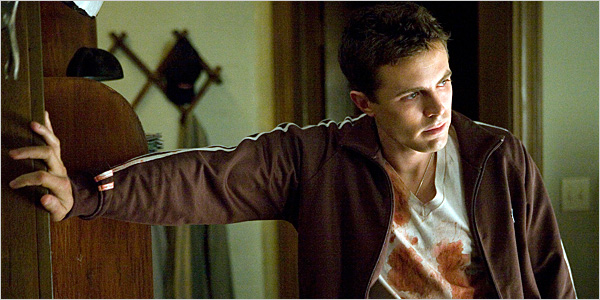
11. Gone Baby Gone: First-time director Ben Affleck acquits himself well with this chronicle of missing children and seedy n’er-do-wells in working-class Boston, wisely choosing to stick with a town and a leading man he knows like the back of his hand. His brother Casey holds his own, and crime author Dennis Lehane’s original source material provides some compelling twists-and-turns throughout. And, as the drug-addled, quick-to-dis Townie mom who’s lost her baby, The Wire‘s Amy Ryan gives arguably the Best Supporting Actress performance of the year (although she’ll likely get some run from Blanchett’s Jude Quinn.)

12. Michael Clayton: Clooney’s impeccable taste in projects continues with this, Tony Gilroy’s meditation on corporate malfeasance and lawyerly ethics (or lack thereof.) The bit with the horses still seems a convenient (and corny) happenstance on which to hang such a major plot point, and I found Tilda Swinton to be overly mannered and distracting for much of the film’s run. But most else about Michael Clayton, from Sidney Pollack’s Master of the Universe to Michael O’Keefe’s snide, unctuous #2 to Tom Wilkinson’s last scene to Clooney not rebounding as well to events as, say, Danny Ocean, rang true. A small film, in its way, but a worthwhile one.
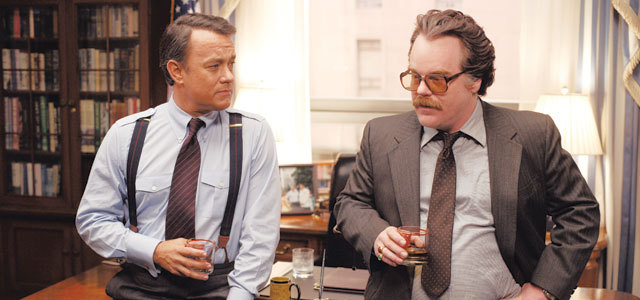
13. Charlie Wilson’s War: Another one I wrote on in the past 24 hours, so I don’t have much to add. Perhaps the best thing about Mike Nichols and Aaron Sorkin’s adaptation of Crile’s book is that it “gets” politics like few recent Washington thrillers I can think of. Philip Seymour Hoffman shows impeccable comic timing as the gruff Gust Avrakotos, and he works very well with Hanks here, who’s gone from being overexposed a few years ago back to a guy I wouldn’t mind seeing more of, particularly if he continues along the Alec Baldwinish character actor path Wilson sometimes suggests could be his future.
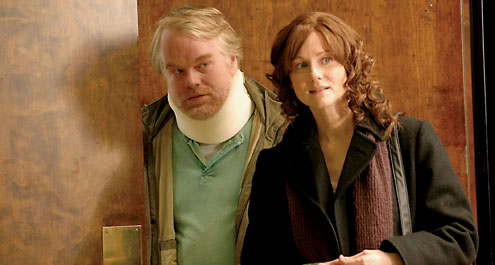
14. The Savages: I actually thought about putting Tamara Jenkins’ The Savages higher on this list, and few other movie endings this year hit me in the gut quite like this one. But, there are definite problems here, such as the wheezy Gbenga Akinnagbe subplot, which compel me to keep it here in the mid-teens. Still, this comedy about an ornery lion in winter, and the battling cubs who have to come to his aid, is a worthwhile one, and particularly if you’re in the mood for some rather black humor. As Lenny the senescent and slipping paterfamilias, Philip Bosco gives a standout performance, as does Hoffman as the miserable Bertholdt Brecht scholar trapped in deepest, darkest Buffalo.
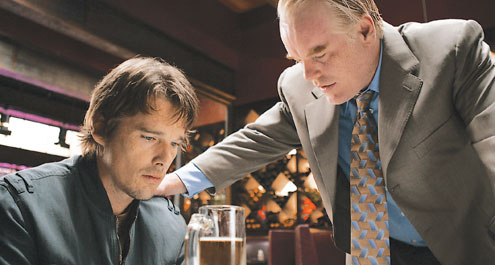
15. Before the Devil Knows You’re Dead: Now, Before the Devil is a movie I did end up seeing twice, on account of Brooklyn friends who were looking to catch it, and the film didn’t bring much new to the table on that second viewing. Still, Sidney Lumet and Kelly Masterson’s lean family tragedy benefits from several excellent performances — most notably by Hoffman, Ethan Hawke, Marisa Tomei, and Albert Finney, but also in supporting work by Amy Ryan, Michael Shannon, Brian O’Byrne, and Rosemary Harris — as well as a memorable Carter Burwell score. (Also, it’s just a coincidence that the three Hoffman movies ended up in a row like this — Still, it’s a testament to the man’s ability that he seemed unique and fully formed in each. Then again, the only time I can think of that Hoffman was actually bad in a film was Cold Mountain, which was pretty glitched up regardless.)

16. Sunshine: Along with There Will Be Blood, Danny Boyle and Alex Garland’s exasperating Sunshine is the other film this year that saw an amazing first hour become undone by breathtakingly poor choices on the back end. Unlike the halting, confused slide of TWBB, though, the moment where Sunshine slips the rails is clear-cut and irrefutable: It’s when what had been a heady science fiction tale about a near-impossible mission to the heart of the sun became instead an unwieldy space-slasher flick, i.e. basically an Armageddon variation on Jason X. The wreckage this subplot makes of what had been a superior hard-sci-fi film is more than a little depressing…Still, for that first hour, Sunshine is really something, perhaps the best realistically-portrayed outer space voyage we’ve seen on-screen in years.
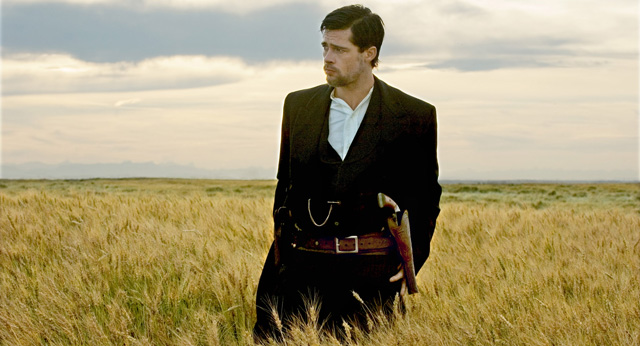
17. The Assassination of Jesse James by the Coward Robert Ford: Andrew Dominik’s sprawling psychological western about the end of the West and the early days of American celebrity-worship is every bit as ambitious and flawed as PTA’s There Will Be Blood. Still, maybe it’s the often stunning Roger Deakins cinematography, or the lively character actors (Sam Rockwell, Jeremy Renner, Garret Dillahunt) in the margins of the film, or maybe it’s even the terrible omniscient voiceover, which is every bit as distracting as the similarly ham-handed one in Little Children, and so goofy at times it verges on endearing. Whatever it is, I warmed to Jesse James more than I probably should, and for whatever reason I feel more willing to forgive it its considerable problems. If you blinked, you probably missed its theatrical run…but maybe it’ll find new life on DVD, when the 160-min running time won’t seem so off-putting.
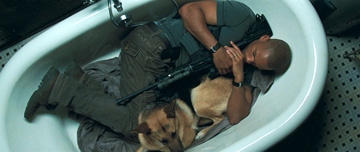
18. I am Legend: When the film focused on Will Smith and his dog fighting blood-sucking and badly rendered CGI Infecteds (whose level of social deevolution changed back and forth solely to accommodate turns in the plot), Francis Lawrence’s I am Legend could seem pedestrian and forgettable. But, when the movie focused on Will Smith and his dog fighting interminable loneliness in an eerily abandoned New York City, which was most of the first two-thirds of the film, I am Legend was a surprisingly melancholy and resonant blockbuster. What can I say? This one hit me where, and how, I live.
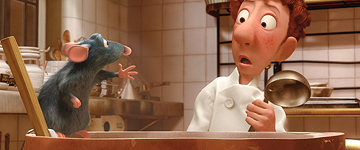
19. Ratatouille: There’s no review of this one up — I actually only saw it on DVD last week. And yet, while Ratatouille is a visual marvel (and Brad Bird and the PIXAR gurus don’t seem to make bad films), I found this nowhere near as inventive or entertaining as their last collaboration, 2004’s The Incredibles. (I’d put this one at about the level of Cars.) Now, this may in part be due to the fact that I have much more interest in comic book conceits than the culinary arts. (I’d even go so far as to say that I find many foodies — particularly those who blather on endlessly about Parisian cuisine — kind of insufferable.) Still, even given my relative lack of interest in the subject matter, Ratatouille bugged me. If “anyone can cook,” as Chef Gustave proclaims, why is no one’s input ever important but the rat? If it’s bad to make money selling pre-cooked (and affordable) food to the teeming masses, as Ian Holm’s character tries to do, why is it any better to do what Remy does? (And why should we care then when he and Gustave Jr. move into a deluxe apartment in the sky? I thought this enterprise wasn’t about making money.) In short, I thought Ratatouille wanted to have it both ways, cloaking a rather elitist, even snobbish story in the trappings of democratic tolerance. And the closing monologue by Peter O’Toole’s Anton Ego, which I thought ostensibly tried to make the movie critic-proof, irked me too. But, all that aside, it does look real purty.
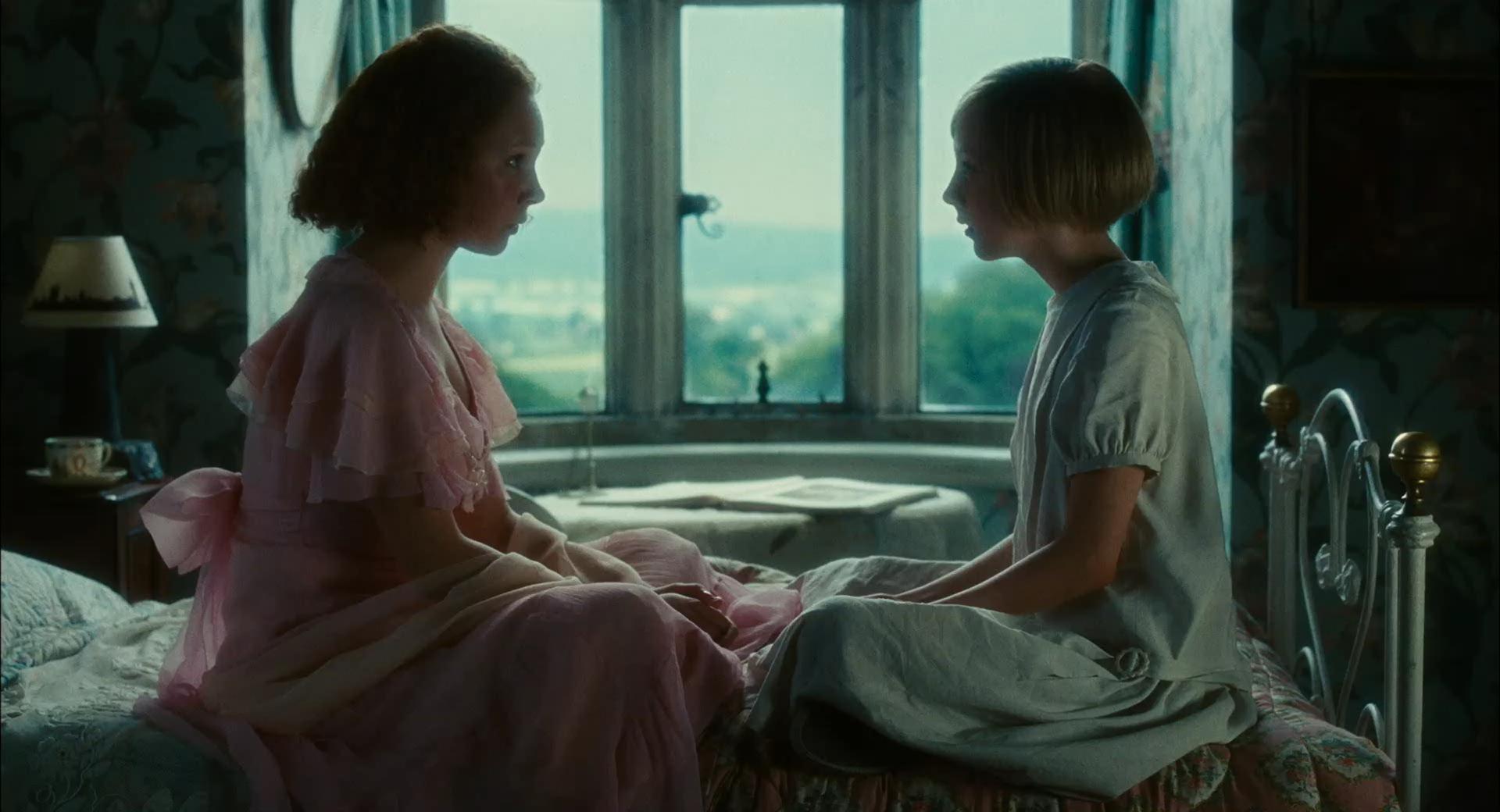
20. Atonement: There were several contenders for this last spot on this list, including Harry Potter and the Order of the Phoenix, The Simpsons Movie, and Jason Reitman’s Juno. But in the end I went with Joe Wright’s take on Ian McEwan’s novel, partly because people I trust who haven’t read the book beforehand haven’t shared my issues with the film. If nothing else, Atonement looks ravishing, and it features breakout performances by James McAvoy, Romola Garai, and Saiorse Ronan. Still, in a year that saw No Country and Diving Bell, I wish Wright had been less conventional in its approach to the story, and found a way to do the gloomy, misanthropic ending of McEwan’s novel justice.
Most Disappointing: The Golden Compass, Grindhouse, Spiderman 3, Southland Tales
Worth a Rental: 3:10 to Yuma, Beowulf, Eastern Promises, Harry Potter and the Order of the Phoenix, Juno, Live Free or Die Hard, Lust, Caution, Ocean’s 13, The Simpsons Movie, Stardust, Superbad, Walk Hard: The Dewey Cox Story
Don’t Bother: 300, Across the Universe, American Gangster, The Darjeeling Limited, Interview, The Invasion, Margot at the Wedding, The Mist, Pirates of the Caribbean 3: At World’s End, Transformers, You Kill Me
Best Actor: Tommy Lee Jones, In the Valley of Elah; Daniel Day-Lewis, There Will Be Blood
Best Actress: Ellen Page, Juno
Best Supporting Actor: Javier Bardem, No Country for Old Men
Best Supporting Actress: Amy Ryan, Gone Baby Gone; Cate Blanchett, I’m Not There
- A Good Year For:
- Casey Affleck (Assassination of Jesse James, Gone Baby Gone)
- Judd Apatow (Knocked Up, Superbad, Walk Hard)
- Josh Brolin (American Gangster, Grindhouse, In the Valley of Elah, No Country)
- Michael Cera (Superbad, Juno)
- Garret Dillahunt (No Country for Old Men, Assassination of Jesse James)
- Full-Frontal Parity (Diving Bell, Eastern Promises, I’m Not There, Walk Hard)
- Philip Seymour Hoffman (Before the Devil, Charlie Wilson’s War, The Savages)
- Tommy Lee Jones (In the Valley of Elah, No Country for Old Men)
- Man’s Best Friend (I am Legend, The Savages)
- Pregnant Hipsters (Knocked Up, Juno)
- Seth Rogen (Knocked Up, Superbad)
- Amy Ryan (Before the Devil, Gone Baby Gone)
- Texans (No Country for Old Men, Charlie Wilson’s War)
- The Western (3:10 to Yuma, Assassination of Jesse James, No Country for Old Men, There Will Be Blood)
- A Bad Year For:
- The Beatles (Across the Universe, Walk Hard)
- Josh Brolin’s PETA standing (American Gangster, No Country for Old Men)
- Great Cities (28 Weeks Later, I am Legend)
- Kidman/Craig Pairings (The Invasion, The Golden Compass)
- The Male Derriere (Charlie Wilson’s War, Margot at the Wedding)
- Standard-Issue Music Biopics(I’m Not There, Walk Hard)
2008: Be Kind, Rewind, Cassandra’s Dream, Cloverfield, The Curious Case of Benjamin Button, The Day the Earth Stood Still, Funny Games, Harold and Kumar Escape from Guantanamo, Harry Potter and the Half-Blood Prince, Hellboy 2: The Golden Army, In Bruges, The Incredible Hulk, Indiana Jones and the Kingdom of the Crystal Skull, Iron Man, James Bond 22, Jumper, Leatherheads, My Blueberry Nights, The Chronicles of Narnia: Prince Caspian, Revolutionary Road, Run, Fat Boy Run, Speed Racer, Star Trek, Valkyrie, Wall-E, Wanted, The X-Files 2…let’s see, am I missing anything…?

Welcome, 2008. I’ll see y’all on the other side.
For Whom the Corona Clacks.
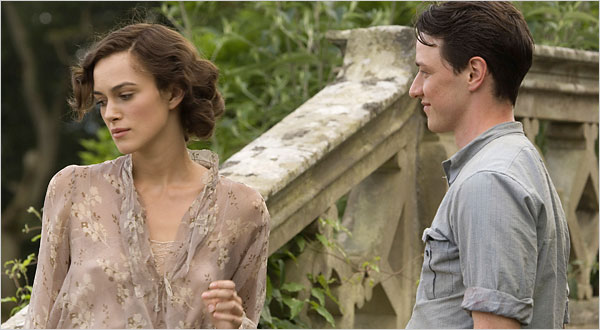
When I first saw the trailer for Joe Wright’s version of Ian McEwan’s Atonement, I figured I’d probably give it a pass — It had that staid period piece look to it that screams inert Oscar bait (see also The English Patient), and seemed far too dry and conventional to do justice to Ian McEwan’s powerful, absorbing novel. But, having sat through it several more times, I got Dario Marianelli’s pensive piano-and-typewriter score stuck in my head, and when the reviews came back significantly better than I expected (and, indeed, the film garnered 7 Globe nominations this morning), I figured I’d give it a go. And the verdict…well, it comes out somewhere in-between. Atonement is solid enough entertainment of the Merchant-Ivory sort, and it features break-out performances by The Last King of Scotland‘s James McAvoy (that whooshing sound you hear is all of Ewan MacGregor’s old scripts getting remailed) and newcomer Romola Garai. But, although occasionally you can see director Joe Wright try to stick his head under the water, the movie sadly just skims along the surface of McEwan’s book. And as an adaptation of said book, it must be considered a failure.
Now, admittedly, there’s a pretty tough degree of difficulty here. I hesitate to think any book is inherently unfilmable — just this month we’ve had two excellent adaptations in No Country for Old Men and The Diving Bell and the Butterfly — but McEwan’s dense tome, with its rich inner worlds, abrupt shifts in time, and philosophical musings on the power and moral dangers of writing and imagination, comes pretty darn close. Regardless, Atonement the film never plumbs the depths that McEwan’s novel does, a fact that unfortunately becomes more and more unmistakable as the movie progresses. By the end, all the crisp British diction and sweeping long-takes can’t disguise the fact that Atonement, however pretty, never captures the book’s mordant pulse.
To the story: Atonement begins at an edenic English manor on one of the hottest days of 1935, where an ambitious, headstrong 12-year-old girl named Briony Tallis (Saoirse Roman, a find) has just completed her first full-length play, The Trials of Arabella. (Like many aspiring writers, myself included, Ms. Tallis just loves her some descriptive adjectives.) Young Briony is unsuccessfully trying to convince her bored cousins, visiting on account of a hush-hush impending divorce, to take her magnum opus seriously, when she sees something unexpected. Outside her window, Robbie the housekeeper’s son (McAvoy) appears to be ogling Briony’s soaking wet, nearly-naked sister Cecilia (Keira Knightley) with amusement and maybe even something darker…what’s the word? As Briony tries to piece it together, we discover Cecilia and Robbie are Oxford classmates, although (by Cecilia’s design as well as by class distinctions) they travel in rather different circles. Yet, something flickers between them, and Robbie, while mustering up the nerve to express his affection, types out several different drafts of a love note in his nearby cottage…one of which, composed as a bit of a joke, gets right to the point. (It uses the c-word, and alone gives the film an R-rating. Gasp!) Well, you can then guess which version of the letter mistakenly gets delivered, and by Briony no less, who takes it upon herself to examine it first. Her pre-adolescent confusion mounting, Briony is now seriously distressed by Robbie, on whom she once had a barely understood crush. And when further events that hot summer evening eventually take a turn towards tragedy, she — knowing full well now that he’s a sex maniac — mounts a false accusation against him, one that changes irrevocably the lives of Robbie, Cecilia — and Briony — forever.
Wright’s Atonement does alright by most of this, the first act of McEwan’s book. He cleverly uses the Rashomon device of showing us the same scene several times, and always from Briony’s limited perspective first. But, while Roman seems a gifted and composed actress for her age, the film never really gets across the crucially important fact about Briony: her constant flights of fancy. (It’s not my movie, of course, but I kept thinking what Atonement needed here is something like what Peter Jackson does in Heavenly Creatures, a brief dramatization of her inner fantasy world.) This becomes a constant problem in the film, particularly as it moves on to the fields of Dunkirk and the hospitals of London just before the Blitz — the movie never does a particularly good job of getting into its characters’ heads. As a result, it shows us what happens in the book, but it barely conveys why these events are important or meaningful for our story.
One of the most egregious example of this is an extremely long shot of the chaos at Dunkirk, rivaling the similar extended takes in Alfonso Cuaron’s Children of Men last year: Wounded and dog-tired, Robbie and his two soldier mates wander around the beach, seeing all manner of wartime horror and tomfoolery. But, as it lingers on and on, the shot feels more and more like a stunt, completely dissociated from the tale we’ve theoretically been following. I guess it’d probably play great in a WWII epic that’s actually about Dunkirk, but the important action at that moment for our story is happening within Robbie. Perhaps Wright was trying to make a similar point about film with that exasperating stunt-take as McEwan ultimately does about writing…but, if so, I missed it. (There are other, subtler moments where he comes closer, tho’ — I quite liked Nurse Briony’s red curtain (stage) entrance to her conversation with the French soldier.)
This inherent flaw of Wright’s Atonement — its inability to depict the characters’ interior lives — reaches its nadir in the final moments of the film, when it almost completely botches the final reveal. I won’t give away what happens here, other than to say that, as Matt Zoller Seitz points out, what was a quietly devastating confession to the reader in the book now — because it is voiced in public — instead plays like a tacked-on mea culpa that offers a twist-ending, a saccharine moral, and a few moments of cinema apotheosis, all wrapped up in a Hollywood bow. (Again, not my movie, but having this reveal explained in voiceover over images of the character’s last, lonely days, a la TLJ in No Country, would’ve made a lot more sense.) In a way, Atonement makes exactly the same misstep as Weitz’s Golden Compass: The very last images of the movie are pitched right at the Titanic demographic (and I don’t mean that as a sneer — I loved Titanic.) But they completely sidestep the inherent darkness of McEwan’s ending, and even let the character in question off the hook. Atonement, in McEwan’s world, was never so neat, or easy to come by.
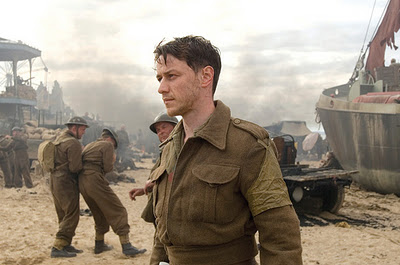
Mrs. Smith & Mr. McAvoy.
The Matrixish trailer for Timur Bekmambetov’s Wanted is now online. Based on a Mark Millar graphic novel I haven’t read, it stars James McAvoy, Angelina Jolie, Morgan Freeman, Terrence Stamp, and Thomas Kretschmann. Well, that’s a solid cast, but I dunno…this looks goofy, and I didn’t really cotton to Night Watch.

